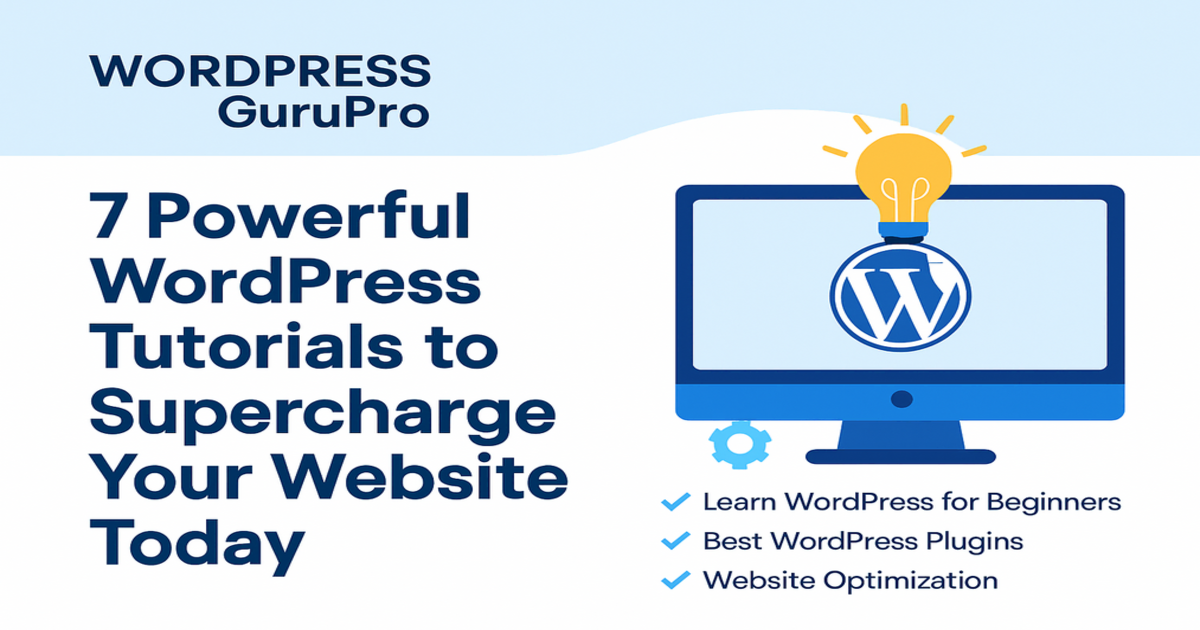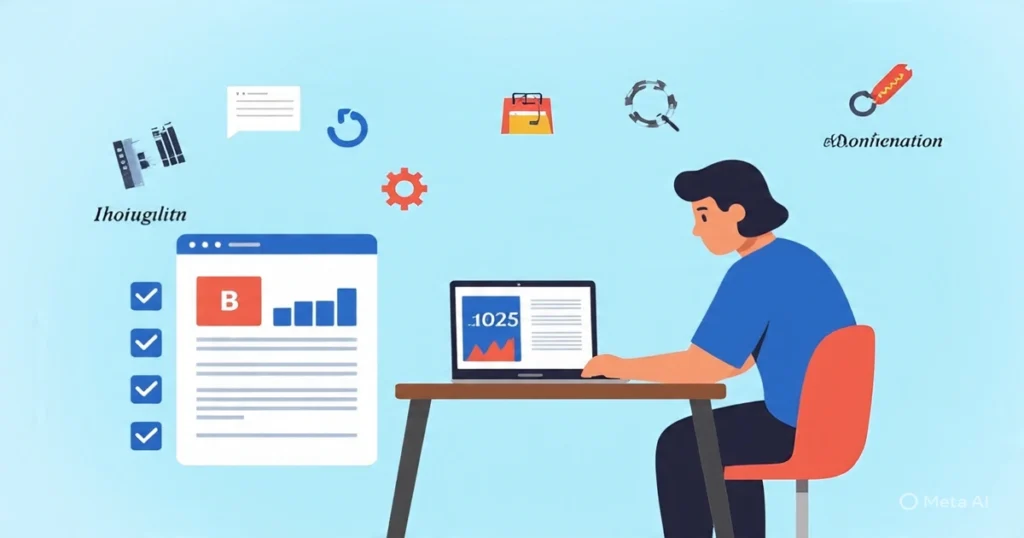
Table of Contents
Introduction
A fast, secure, and engaging website is no longer a luxury. It is essential for success. WordPress powers over 40% of the web for a reason. It is incredibly flexible and user-friendly.
But simply installing WordPress is not enough. You must optimize it.
That’s where the right guidance is critical. The best WordPress tutorials provide that exact roadmap. They offer clear, step-by-step instructions to transform your site.
This guide compiles seven powerful tutorials. They are designed to improve WordPress site performance dramatically. We will cover crucial WordPress website optimization techniques. We will also share essential WordPress tips for beginners.
You will learn how to:
- Boost your site speed significantly.
- Enhance security against common threats.
- Improve your SEO ranking.
- Create a seamless user experience.
Ready to supercharge your website? Let’s dive into these actionable WordPress tutorials.
Why the Best WordPress Tutorials Are a Game-Changer
WordPress powers over 40% of all websites. Its flexibility is unmatched. But this power comes with complexity.
Many users face common struggles. These include slow loading times, security worries, and confusing customization.
This is where expert guidance becomes essential. WordPress tutorials provide the clear path forward.
The best WordPress tutorials do more than just fix problems. They empower you. They turn complex tasks into simple, step-by-step processes.
For beginners, the value is immense. WordPress tips for beginners break down technical jargon. They build confidence and prevent costly errors.
For seasoned users, advanced guides are key. Deep dives into WordPress website optimization can fine-tune every aspect of your site. This leads to better speed, security, and scalability.
Investing time in learning is the smartest way to improve WordPress site performance. It saves you time, money, and frustration in the long run.
Ready to transform your website? Let’s explore the seven powerful tutorials designed to supercharge your site today.
Tutorial 1: Master WordPress Website Optimization for Blazing Speed
Is your website slow? You are losing visitors and revenue. Page speed is a direct ranking factor for Google.
A fast site provides a superior user experience. It also converts better. WordPress website optimization for speed is your first step to success.
This tutorial delivers a proven, step-by-step plan. We use powerful plugins and simple tweaks. They will improve WordPress site performance instantly.
Your Action Plan for a Faster WordPress Site
Follow these essential steps to achieve lightning-fast load times.
1. Audit Your Current Speed
First, know your starting point. Use free tools like:
- Google PageSpeed Insights
- GTmetrix
- Pingdom Tools
These provide a performance score and actionable fixes.
2. Choose a Performance-Optimized Theme
Your theme is the foundation. Avoid bloated, feature-heavy themes.
- Select a lightweight, well-coded theme like GeneratePress, Astra, or Kadence.
- They are built for speed and flexibility right out of the box.
3. Implement Powerful Caching
Caching creates a static version of your site. This drastically reduces server load.
- Install a caching plugin like WP Rocket (premium) or W3 Total Cache (free).
- Enable both page and browser caching in your plugin settings.
4. Compress and Optimize Images
Large images are the #1 cause of slow sites. Never upload huge files directly.
- Use a plugin like Smush or ShortPixel. They automatically compress new images.
- Resize images to the exact dimensions needed before uploading.
5. Minify CSS, JavaScript, and HTML
“Minification” removes unnecessary characters from code files.
- A plugin like Autoptimize handles this with one click.
- It bundles and minifies code to reduce the number of HTTP requests.
6. Leverage a Content Delivery Network (CDN)
A CDN stores your site’s files on servers around the world. This delivers content from a location nearest to your visitor.
- Sign up for a service like Cloudflare (has a generous free plan) or StackPath.
- Integration is usually simple, often through a plugin.
The Powerful Benefits of a Faster Website
- Skyrocket User Engagement: Achieve a page load time under 3 seconds. Users stay longer and bounce less.
- Boost SEO Rankings: Google explicitly rewards fast sites. This is one of the easiest ways to climb search results.
- Increase Conversions: A delay of just one second can drop conversions by 7%. Speed directly impacts your bottom line.
Pro Tip for Beginners: Don’t try to do everything at once. Tackle one step at a time. Start with a caching plugin and image optimization. These two steps alone will deliver a massive performance boost.
By mastering these WordPress tips for beginners and pros alike, you build a foundation for success. Your visitors (and Google) will thank you.
Table 1: Speed Optimization Tools Comparison
| Tool | Free Version Available | Key Features | Best For |
|---|---|---|---|
| WP Super Cache | Yes | Caching, easy setup | Beginners |
| Smush | Yes | Image compression | Photographers |
| Autoptimize | Yes | CSS/JS minification | Developers |
| Cloudflare | Yes | CDN, security | Large sites |
WordPress Optimization Tools Performance
Average page load time reduction (in seconds)
Tutorial 2: Supercharge Your Traffic with Proven WordPress SEO Tutorials
Want free, targeted traffic? Search Engine Optimization (SEO) is the answer. It’s the engine behind long-term, sustainable growth for any website.
WordPress is inherently SEO-friendly. But to truly dominate search rankings, you need a strategy. This is where dedicated WordPress tutorials on SEO become invaluable.
This guide will walk you through professional SEO techniques. We’ll use the powerful All in One SEO (AIOSEO) plugin. It simplifies complex tasks into a few clicks. By the end, you’ll know exactly how to optimize your content to rank higher.
Your Action Plan for Dominating Search Rankings
Follow this step-by-step process to make your site an SEO powerhouse.
1. Install and Configure All in One SEO (AIOSEO)
Your first step is getting the right tool.
- Install the AIOSEO plugin from your WordPress dashboard (Plugins > Add New).
- Run the setup wizard. It guides you through essential settings like connecting to Google Search Console.
2. Master On-Page SEO with Focus Keywords
Every piece of content should target a specific keyword.
- Choose one primary focus keyword per post or page (e.g., “best WordPress tutorials“).
- Input this keyword into AIOSEO’s meta box in the post editor. The plugin will provide a real-time SEO score and suggestions.
3. Craft Irresistible Meta Tags
Your title tag and meta description are your ad in the search results.
- Write compelling title tags under 60 characters. Include your focus keyword near the front.
- Create engaging meta descriptions under 160 characters. Use action-oriented language to boost your click-through rate (CTR).
4. Generate and Submit Your XML Sitemap
A sitemap is a roadmap that helps search engines find all your content.
- AIOSEO automatically generates a sitemap. Find it at
yoursite.com/sitemap.xml. - Submit this sitemap to Google Search Console. This ensures Google crawls and indexes your pages efficiently.
5. Track, Analyze, and Improve
SEO isn’t a “set it and forget it” task. You must monitor what works.
- Use AIOSEO’s built-in analytics to track key metrics directly in your WordPress dashboard.
- Monitor your keyword rankings and page traffic over time. Double down on what brings results.
The Powerful Benefits of Mastering WordPress SEO
- Climb Search Engine Rankings: Achieve prime real estate on Google’s first page for your target keywords.
- Drive Qualified Organic Traffic: Attract visitors who are actively searching for what you offer.
- Build Authority and Trust: A high-ranking site is perceived as more credible and authoritative in its niche.
Pro Tip for Beginners: Don’t get overwhelmed by trying to rank for highly competitive keywords right away. Start with “long-tail keywords” – longer, more specific phrases (e.g., “WordPress tips for beginners in 2024”). They have less competition and often convert better.
Consistently applying these lessons from the best WordPress tutorials on SEO will build a foundation of traffic that grows month after month.
Monthly Organic Traffic Growth
Visits per month after SEO changes (example data)
Tutorial 3: Improving WordPress Site Security
Security is a top concern for any website owner. This tutorial provides WordPress tips for beginners and advanced users to secure their sites against threats.
Steps to Secure Your Site
- Update Regularly: Keep WordPress, themes, and plugins up to date to patch vulnerabilities.
- Install a Security Plugin: Use Wordfence or iThemes Security for firewall protection and malware scanning.
- Enable Two-Factor Authentication (2FA): Add an extra layer of login security.
- Backup Your Site: Set up automated backups with UpdraftPlus.
- Limit Login Attempts: Prevent brute force attacks with plugins like Login LockDown.
Benefits
- Enhanced trust from visitors and search engines.
- Protection against hacks and data breaches.
- Peace of mind with regular backups.
Table 2: Security Plugin Features
| Plugin | Free Version | Malware Scanning | Firewall | Backup Integration |
|---|---|---|---|---|
| Wordfence | Yes | Yes | Yes | No |
| iThemes Security | Yes | Yes | Yes | Yes |
| UpdraftPlus | Yes | No | No | Yes |
Tutorial 4: Customizing Your Site with the Best WordPress Tutorials
Customization sets your website apart from the competition. This tutorial uses best WordPress tutorials to guide you through using the WordPress Customizer and page builders.
Steps to Customize
- Access the Customizer: Navigate to Appearance > Customize in your WordPress dashboard.
- Adjust Theme Settings: Modify colors, fonts, and layouts.
- Use a Page Builder: Install Elementor or Beaver Builder for drag-and-drop design.
- Add Widgets: Enhance sidebars and footers with custom widgets.
- Preview Changes: Test your design before publishing.
Benefits
- A unique website that reflects your brand.
- Easier management of complex layouts.
- No need for coding skills with page builders.
Tutorial 5: Boosting Performance with WordPress Website Optimization Techniques
Beyond basic speed optimization, this tutorial dives deeper into WordPress website optimization with advanced techniques.
Advanced Techniques
- Database Optimization: Use plugins like WP-Optimize to clean up unused data.
- Lazy Loading: Load images and videos only when they enter the viewport.
- Gzip Compression: Enable compression to reduce file sizes.
- Reduce HTTP Requests: Minimize the number of elements on each page.
- Monitor Performance: Use tools like GTmetrix for ongoing analysis.
Benefits
- Reduced server load and bandwidth usage.
- Enhanced mobile performance.
- Consistent high scores on performance tests.
Tutorial 6: Learning WordPress Tips for Beginners to Grow Confidently
For new users, navigating WordPress can be intimidating. This tutorial offers WordPress tips for beginners to build confidence and grow their sites.
Essential Tips
- Understand the Dashboard: Learn the key sections like Posts, Pages, and Settings.
- Use Starter Templates: Begin with pre-designed layouts from themes.
- Install Essential Plugins: Start with Yoast SEO and WPForms.
- Create a Content Plan: Plan posts to maintain consistency.
- Seek Community Help: Join WordPress forums for support.
Benefits
- Faster learning curve for newbies.
- A solid foundation for future growth.
- Reduced frustration with guided steps.
Tutorial 7: Improving WordPress Site with Advanced Features
For seasoned users, this tutorial focuses on how to improve WordPress site functionality with advanced features.
Advanced Features
- Custom Post Types: Create unique content types like portfolios or events.
- WooCommerce Integration: Set up an online store with ease.
- API Development: Use the WordPress REST API for custom applications.
- Multisite Setup: Manage multiple sites from one dashboard.
- Performance Testing: Conduct A/B testing with plugins like Nelio A/B Testing.
Benefits
- Expanded site capabilities for diverse needs.
- Increased revenue potential with e-commerce.
- Scalability for growing businesses.
Integrating These Tutorials into Your Workflow
To maximize the impact of these WordPress tutorials, integrate them into a structured workflow. Start with the beginner tips to establish a foundation, then move to optimization and SEO. As you gain confidence, explore customization and advanced features. Regularly revisit performance and security tutorials to maintain your site’s health.
Sample Workflow
- Week 1: Set up your site with beginner tips.
- Week 2: Optimize speed and SEO.
- Week 3: Customize design and add features.
- Ongoing: Monitor security and performance.
Measuring Success with WordPress Tutorials
To gauge the effectiveness of these tutorials, track key performance indicators (KPIs). Use tools like Google Analytics to monitor traffic, bounce rates, and conversion rates. Compare these metrics before and after applying the tutorials to see tangible improvements.
Key KPIs
- Page Load Time: Target under 3 seconds.
- Organic Traffic: Aim for a 20% monthly increase.
- Bounce Rate: Reduce by 10%.
- Conversion Rate: Increase by 5%.
WordPress Tutorial Success Dashboard
Page Load Time
Target: Under 3s
Organic Traffic
Target: +20% / month
Bounce Rate
Target: -10%
Conversion Rate
Target: +5%
Frequently Asked Questions
Key Takeaways
- Enhance SEO Performance: Leverage plugins like AIOSEO to optimize meta tags and sitemaps, increasing organic traffic.
- Strengthen Security: Apply WordPress tips for beginners with security plugins and regular backups to protect your site.
- Customize Effectively: Utilize the Customizer and page builders from the best WordPress tutorials to create a unique design.
- Advance Your Skills: Learn WordPress website optimization techniques like lazy loading and database cleanup for better performance.
- Build Confidence: Follow beginner-friendly guides to navigate the dashboard and plan content successfully.
- Unlock Advanced Features: Use custom post types and WooCommerce to improve WordPress site functionality and scalability.
- Track Progress: Monitor KPIs like load time and traffic to measure the impact of these tutorials.
Conclusion
Mastering WordPress tutorials is the key to supercharging your website today. From WordPress website optimization to advanced features, these seven tutorials provide a comprehensive roadmap to enhance your site’s performance, security, and user engagement. Whether you’re looking for the best WordPress tutorials or WordPress tips for beginners, this guide has you covered. Start implementing these steps, and watch your website thrive in 2025 and beyond.
For ongoing learning, explore WordPress communities, online courses, and documentation. With dedication and the right tools, your WordPress site can achieve new heights. Ready to get started? Dive into the first tutorial today!
🚀 Launch Your Online Dreams with Hostinger!
The content of this post is for general information only; we make no guarantees about its accuracy or completeness, and you use it at your own risk. We also use Google AdSense and affiliate links, meaning we may earn a small commission from purchases or clicks at no extra cost to you. This supports our site, and we only recommend products we believe in.
✨ Connect with Us ✨
Stay updated with our latest WordPress guides, SEO tips, and AI tools. Follow us on social media or reach out via email!
📢 Sharing is Caring. Please Share this.
You May Also Like:
Explore more powerful insights to level up your WordPress and SEO game:
💡 Keep exploring insightful tips and strategies at WordPressGuruPro.com


